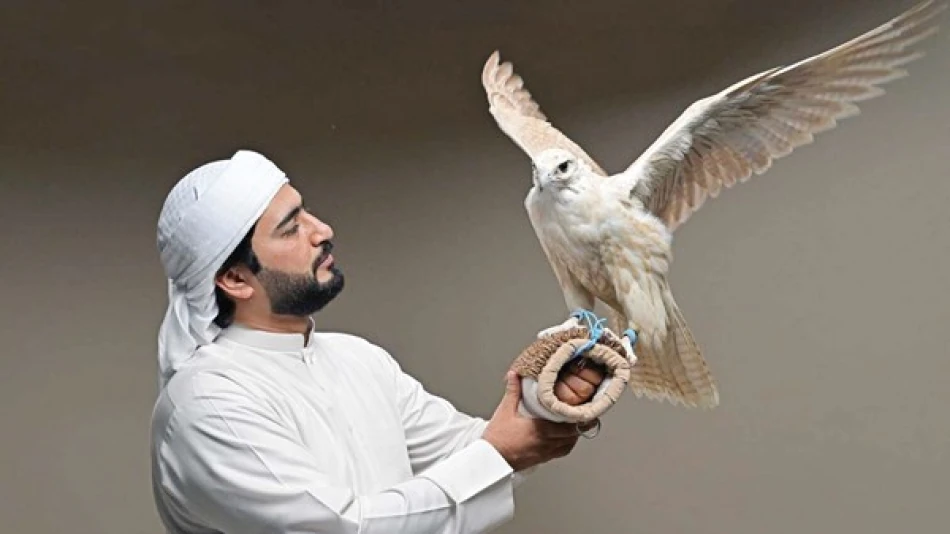
Abu Dhabi Concludes 'Hunting and Equestrianism 2025' with Exceptional Success
**Abu Dhabi Hunting and Equestrian Exhibition Cements Middle East's Cultural Heritage Leadership**
The 22nd Abu Dhabi International Hunting and Equestrian Exhibition has concluded after nine days of showcasing how traditional heritage can drive modern economic growth. With over 2,000 companies from 68 countries and record-breaking falcon auction sales reaching 130,000 dirhams per bird, the event demonstrates the UAE's strategic positioning as the global hub for falconry, equestrian sports, and cultural tourism in a region where tradition increasingly translates to substantial business value.
Unprecedented Growth Signals Market Maturation
The exhibition's 21% growth in participating companies compared to last year reflects a broader trend across the Gulf states: heritage-based industries are becoming serious economic drivers. The event expanded to 92,000 square meters, accommodating 2,068 companies and brands from 68 countries, with 11 nations participating for the first time.
This growth trajectory mirrors similar cultural exhibitions across the region, particularly in Saudi Arabia's Vision 2030 initiatives and Qatar's cultural diversification efforts. However, Abu Dhabi's 22-year track record—from 40 companies in 2003 to over 2,000 today—positions it as the established leader in this niche but lucrative market.
Falcon Trading Emerges as High-Value Asset Class
Premium Bird Auctions Drive Market Confidence
Eight exclusive falcon auctions featured 46 local and international falcon farms—a four-fold increase from 2024. The standout sale of a "Gyr Peregrine" falcon for 130,000 dirhams signals that rare birds are increasingly viewed as alternative investments, similar to art or luxury collectibles.
Companies like KH Falcons and GYR Falcon showcased birds ranging from 5,000 dirhams to over one million dirhams, with GYR Falcon selling 25 birds during the event. This pricing spectrum indicates a maturing market with entry-level options for enthusiasts and ultra-premium specimens for serious collectors.
Breeding Technology Transforms Ancient Practice
The integration of European and American falcon egg imports to enhance local breeding programs demonstrates how traditional falconry is adopting biotechnology. Hadi Al Mansouri of KH Falcons emphasized that falconry has evolved from a Bedouin tradition into a comprehensive global industry utilizing advanced breeding and training methods.
This technological integration positions the UAE similarly to how Singapore transformed traditional trading into a modern financial hub—preserving cultural essence while embracing innovation.
Cultural Sectors Create Economic Multiplier Effects
Arabian Saluki Dogs and Traditional Crafts Gain Commercial Traction
The addition of four new sectors this year—camels, Arabian Salukis, knives, and marketplace areas—reflects expanding commercial interest beyond falconry. The Arabian Saluki beauty competition featuring 64 dogs across two categories demonstrates how niche cultural practices can generate tourism and breeding industry revenue.
The Zee Collection's participation, creating unique metal sculptures from construction iron, illustrates how traditional themes inspire contemporary art markets. Their custom-made, never-reproduced pieces cater to collectors seeking authentic cultural artifacts with modern artistic value.
Educational Programming Builds Future Market Base
Interactive workshops covering everything from falcon training to children's desert adventure stories serve a dual purpose: preserving cultural knowledge while cultivating future participants in heritage-based industries. This approach mirrors successful cultural preservation strategies in countries like Japan, where traditional arts maintain economic relevance through education and tourism.
Regional Positioning and International Implications
UAE Consolidates Middle East Cultural Tourism Leadership
The exhibition's ability to attract over two million visitors from 125 nationalities over 22 years positions Abu Dhabi as the undisputed regional center for hunting and equestrian culture. This creates significant advantages for local businesses and establishes the UAE as the go-to destination for international companies entering Middle Eastern heritage markets.
The presence of advanced veterinary services, including the Advanced Scientific Group's research center founded in 1990, adds scientific credibility to traditional practices. Their handling of 1,200 pregnancy cases annually using embryo transfer, cloning, and genetic testing for camels demonstrates how the UAE combines cultural preservation with cutting-edge science.
Investment and Tourism Synergies
The exhibition's success creates positive spillover effects for Abu Dhabi's broader tourism and investment strategy. International participants in falcon auctions, equestrian events, and cultural workshops represent potential investors in UAE's diversified economy beyond oil.
The event's emphasis on sustainability and environmental awareness—through eco-tourism offerings from UAE, South Africa, and Botswana—aligns with global trends toward responsible luxury tourism, a growing market segment where the UAE competes directly with destinations like Kenya and Costa Rica.
Market Outlook and Strategic Implications
The 22nd edition's record performance suggests that heritage-based industries in the Gulf region are entering a mature growth phase rather than experiencing temporary popularity. The combination of serious investment activity in falcon trading, technological advancement in breeding programs, and expanding international participation indicates sustainable long-term development.
For investors and businesses, the exhibition demonstrates how cultural authenticity can create defensible market positions in an increasingly globalized economy. The UAE's success in transforming traditional practices into modern industries offers a replicable model for other nations seeking to monetize their cultural heritage while preserving its essential character.
The integration of art galleries, educational programs, and high-tech veterinary services within a traditional hunting and equestrian framework shows how cultural events can evolve into comprehensive economic ecosystems—a strategy that positions Abu Dhabi favorably for continued growth in the global cultural tourism and heritage industries market.
Most Viewed News

 Layla Al Mansoori
Layla Al Mansoori






